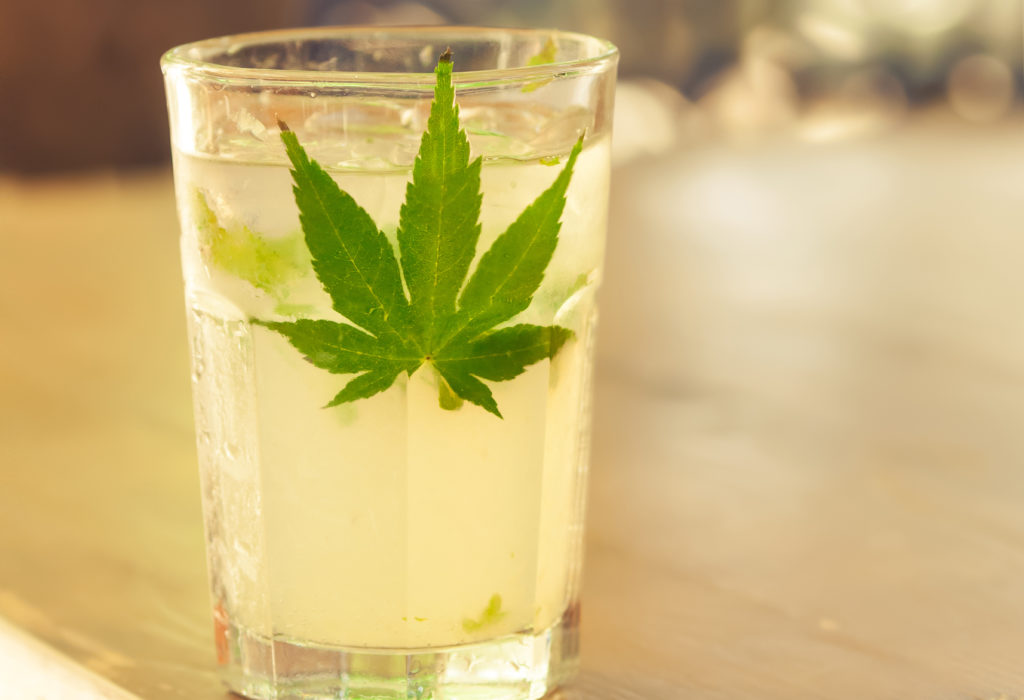 It’s that time of the week. We’ve navigated our way past ‘hump day’ and are cruising down the straight towards Friday. We’re putting in additional efforts to wrap up projects, to get tasks firmly off our desks (and hopefully onto that of our boss), and to ready ourselves for the blissful two-day mini-vacation we lovingly call ‘The Weekend.’ And how do we plan to kick off the hebdomidal festivities? With an ice cold beer, a full bodied glass of Cabernet, or perhaps a mint-laced mojito sweating in a highball glass.
It’s that time of the week. We’ve navigated our way past ‘hump day’ and are cruising down the straight towards Friday. We’re putting in additional efforts to wrap up projects, to get tasks firmly off our desks (and hopefully onto that of our boss), and to ready ourselves for the blissful two-day mini-vacation we lovingly call ‘The Weekend.’ And how do we plan to kick off the hebdomidal festivities? With an ice cold beer, a full bodied glass of Cabernet, or perhaps a mint-laced mojito sweating in a highball glass.
But wait: alcohol is so last century. These days we have myriad other options for relaxing, mind-altering substances and, if developments in Canada, Washington state, and California are anything to go by there just may be a new guy in town – one with a strange partnership of bedfellows…
As we have explored in previous articles, we human beings are indeed a curious species. We are contradictory, yet pride ourselves on our rational nature. We can hold two entirely different ideas in our minds, yet refuse to acknowledge the cognitive dissonance of our position. And we can live in a socially advanced era with technology that would have been regarded by our ancestors as pure witchcraft or magic, yet stolidly refuse to even notice the marvels with which we are surrounded.
And above all, we can profess to engaging with our lives on the fullest level, yet seek to escape them wherever and however possible. And it has always been so.
From the earliest times of human history, people have used (perhaps mis-used?) substances to escape reality and enter into an altered state of consciousness. From the use of harmal in Iranian and Andean cultures to the blue lotus of the ancient Egyptians, natural intoxicants, pharmacological innovations, food, and alcohol have all played their parts in shutting down, expanding, or stabilizing the human mind and its emotions. And as we’ve explored and innovated, the ‘powers that be’ – those in control – have sought to stifle or contain our forays into an altered consciousness, depending on your point of view. From the Prohibition of 1920 to 1933 to the still ongoing war on drugs begun under the Nixon administration, authorities have limited or curtailed access to mind-altering substances via criminalization, education, and social manipulation. But through it all, man – ever resourceful – seems to have found a way around the restriction.
And the latest iteration of this dynamic may well be the uptick in interest in a previously untapped market. To date, we’ve looked into the allure of ruby chocolate, wine-infused coffee, and cannabis edibles, so let’s add to that stable of articles by approaching the latest and greatest, a trend that our transatlantic cousins seem to regard with a certain measure of bemusement: cannabis-infused adult beverages…
British viewers’ general interest in the topic speaks to a push against the continued criminalization of a herb which many proponents see as less harmful than alcohol.
This week, a new series played across British screens: Gone to Pot: The American Road Trip. In it, five aging celebrity personalities of stage and screen journey across the U.S. sampling marijuana and pondering the wisdom – or otherwise – of the legalization of the drug for medicinal and/or recreational purposes. British viewers’ general interest in the topic speaks to a push against the continued criminalization of a herb which many proponents see as less harmful than alcohol. But it also revealed a deep misunderstanding of the complexities of the American legal system, specifically the tension between criminalization at a federal level versus that at a state level.
Fortunately for U.K. readers, an article published in the New York Times by journalist Avantika Chilkoti clearly articulates the battleground between states’ rights and federal governmental oversight. While the 2016 elections saw no fewer than eight states legalizing cannabis use for medical or recreational use, Attorney General Jeff Sessions has openly compared the plant with another favorite psychedelic botanical, the heroine poppy. Supportive of Sessions’ positioning and hostile to the idea of ‘recreational’ marijuana, Scott Chipman, chairman of Southern California’s ‘Citizens Against Legalizing Marijuana’ proclaimed: “‘Recreational’ is a bike ride, a swim, going to the beach. Using a drug to put your brain in an altered state is not recreation. That is self-destructive behavior and escapism.”(1) Although championing cycling and swimming, Chipman clearly fails to grasp the concept of exercise-induced Brain-Derived Neurotrophic Factor (BDNF), a protein that protects and repairs neurons, leaving us feeling relaxed and clear-headed after exercise. And then there’s the altered state associated with endorphin release – the natural ‘feel-good’ chemicals that promote sensations of euphoria. But we digress…
One prime example is the move by Constellation Brands – the $42 billion conglomerate behind such everyday labels as Corona, Modelo, and Svedka vodka – to acquire a minority stake in Canadian company Canopy Growth. Openly traded on the Toronto Stock Exchange (as WEED)…
Yet, regardless of the AG’s position on marijuana, it seems that the landscape is changing. With increased public acceptance and a push to regulate the industry – for instance by allowing banks to work with marijuana growers and retailers – some law-makers choose to focus on the benefits of legalization. Regulation, taxation, and transparency are watch words, as legislators like Elizabeth Warren (Democrat – Massachusetts) and Lisa Murkowski (Republican – Alaska) play up the potential for neutering black marketeers and drug-fuelled money launderers. And, in the spirit of ‘build it and they will come,’ commercial interests ride the slipstream of increased social and governmental acceptance. One prime example is the move by Constellation Brands – the $42 billion conglomerate behind such everyday labels as Corona, Modelo, and Svedka vodka – to acquire a minority stake in Canadian company Canopy Growth. Openly traded on the Toronto Stock Exchange (as WEED), Canopy serves both domestic and international customers in the medical marijuana market. Founded in 2014, it has matured in this still relatively young industry by identifying customer trends in the early stages and catering to them.
But why would Constellation be interested in this form of diversification?
Despite recent earnings reports showing a 13% increase in its beer sales, the company is aware of a sea change. A rising tide of health awareness that creates in conscious consumers an interest in beverages that mildly intoxicate without the deleterious effects inherent in alcohol consumption. Already a player in the realms of ‘buzz-inducing sodas, coffees, and fruit elixirs,’ Constellation sees this shift as part of the next growth area when cannabis consumption is legalized across the nation.(2)
But there are still a couple of hurdles to leap before Constellation – or indeed any food product manufacturer – can cash in on the nascent market. Under the banner that ‘the buzz is not always the biz,’ the first of these is taste.
…one of the reasons cannabis-infused drinks are not exactly taking the world by storm, is, in part, their ‘earthy’ taste.
According to an article last year in Forbes, one of the reasons cannabis-infused drinks are not exactly taking the world by storm, is, in part, their ‘earthy’ taste.(3) Headset Cannabis Intelligence, a business intelligence and data analytics service, reported that cannabis-infused beverages topped the market at 5% in 2016 and then slumped, and this could be due to a consumer preference for edibles such as chocolates and candy. Of the top selling beverage brands, Legal Beverages, a line created by Washington state-based Mirth Provisions, dominates the market with a 36% share, while Zoots and Cannabis Quencher straggle behind with 29% and 20% shares respectively. While Legal Beverages offers five flavors – of which one is pure indica, one pure sativa, and three are hybrids – Cannabis Quencher boasts a line of no fewer than 21 different varieties, all in a fruity base. Whether you’re looking to chill out to old-fashioned lemonade or to perk up with a blend of pomegranate-blueberry-acai, the quenchers seem to have you covered.
The secondly hurdle, however, is that of legalization. Constitutionally, although there is an inherent tension between federal law and states’ rights, federal rulings will always preempt those of individual states. This means, in effect, that dispensaries, growers, retailers, and manufacturers located where the use of cannabis as a recreational or medicinal product has been legalized can still run foul of the law at the federal level. With individual possession charges punishable by a $1000 fine and up to a year jail time, the sentence of life imprisonment for growers and cultivators is even more sobering. It is worth noting that, while reserving the future option of purchasing an increased stake in Canopy Growth, Constellation Brands has elected not to sell any cannabis-related products within the U.S. or overseas until such time as the sales are permissible at both the state and federal levels. Clearly, however, it would seem that the company is banking – literally – on that becoming the case.
…the U.S. Food and Drug Administration (FDA) is starting to come down hard on companies making (allegedly bogus) health claims about cannabis-derived treatments.
The third hurdle to the broader acceptance of marijuana-infused beverages is the slew of perhaps spurious health claims emerging in recent years. While many legitimate companies are actively engaged in quantifiable and demonstrable analysis and evaluation of the health benefits of their products, a shadow side also exists. According to an article published this month in PharmTech.com, an online portal of development and manufacturing, the U.S. Food and Drug Administration (FDA) is starting to come down hard on companies making (allegedly bogus) health claims about cannabis-derived treatments. In letters sent to four businesses – Greenroads Health, Natural Alchemist, That’s Natural! Marketing and Consulting, and Stanley Brothers Social Enterprises – authorities cautioned that, in the interest of public health, ‘unsupported claims regarding preventing, reversing, or curing cancer, killing or inhibiting cancer cells or tumors, or other such anti-cancer claims’ would not be tolerated.(4)
So where does this leave the thirsty cannabis enthusiast? On balance, it would seem that the potential field is wide open. Given that the past three years have witnessed a mushrooming of an original 35 edible products to over 600, it would seem that innovation follows acceptance and demand. And let’s not forget that infused beverages have long held the allure of the delicate, the healthful, the wistful. Casting our minds back to our recommended college reading, we may recall coming upon the tea-fueled ‘Proustian moment’ of the eponymous author’s seminal work, In Search of Lost Time. In this enduring classic of Belle Époque France, the tisane becomes the key to life-changing events. The sensory cue of the madeleine – a bite-sized cake – dipped into a lime-flower beverage sets in motion the journey of Proust’s protagonist into his childhood and unlocks secrets long buried. The links between memory and perception are strengthened, torn apart, and reformed, and by means of a simple botanical the tantalizingly anonymous character experiences an altered state of perception and recall.
That said, however, given the oftentimes memory-inhibiting qualities of cannabis, it may be that, unlike Proust’s narrator, modern-day drinkers leverage their beverage less to remember and more to forget.
Cannabis-infused beverages – are they for you? Would you prefer to snack on an edible, leverage a beverage, or venture out on a hearty cycle ride? We’d love you know your thoughts!
References:
- https://www.nytimes.com/2017/07/15/us/politics/marijuana-laws-state-federal.html
- https://www.marketwatch.com/story/drinkable-pot-constellation-brands-takes-stake-in-marijuana-company-2017-10-29
- http://www.forbes.com/sites/deborahborchadt/2016/06/29/marijuana-drinks-not-causing-a-buzz
- http://www.pharmtech.com/fda-warns-companies-claiming-marijuana-products-cure-cancer-0
